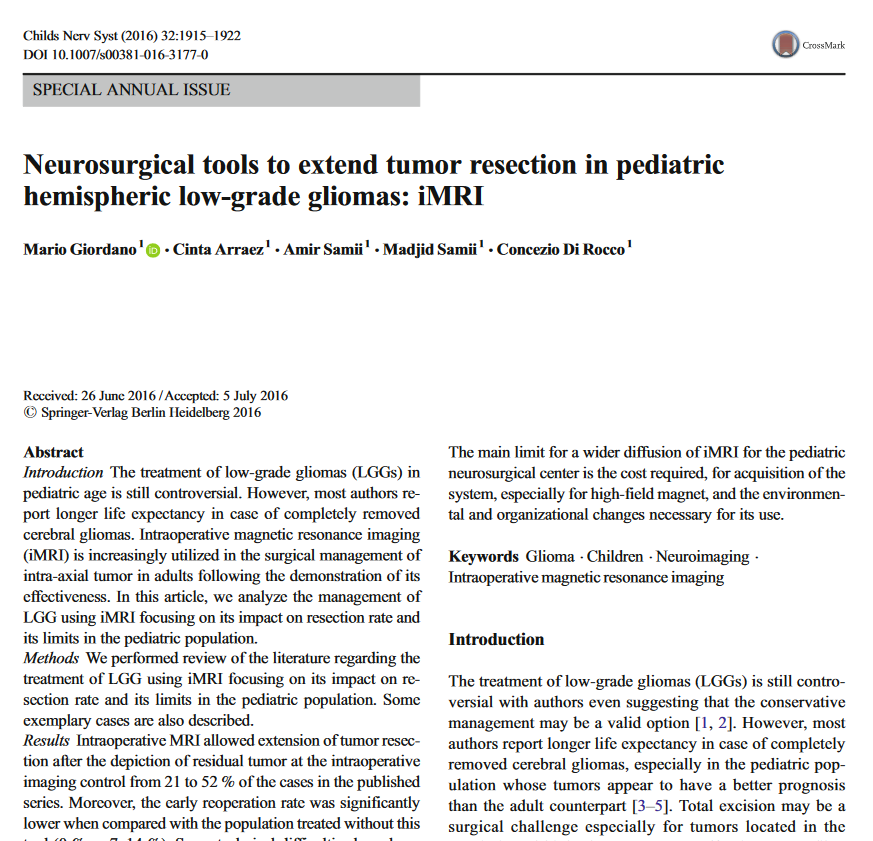Abstract
Introduction:The treatment of low-grade gliomas(LGGs)in pediatric age is still controversial.However,most authors report longer life expectancy in case of completely removed cerebral gliomas.Intraoperative magnetic resonance imaging(iMRI)is increasingly utilized in the surgical management of intra-axial tumor in adults following the demonstration of its effectiveness.In this article,we analyze the management of LGG using iMRI focusing on its impact on resection rate and its limits in the pediatric population.
Methods:We performed review of the literature regarding the treatment of LGG using iMRI focusing on its impact on resection rate and its limits in the pediatric population.Some exemplary cases are also described.
Results:Intraoperative MRI allowed extension of tumor resection after the depiction of residual tumor at the intraoperative imaging control from 21 to 52%of the cases in the published series.Moreover,the early reoperation rate was significantly lower when compared with the population treated without this tool(0%vs 7-14%).Some technical difficulties have been described in literature regarding the use of iMRI in the pediatric population especially for positioning due to the structure of the headrest coil designed for adult patients.
Conclusion:The analysis of the literature and our own experience with iMRI in children indicates significant advantages in the resection of LGG offered by the technique.All these advantages are obtained without elongation of the surgical times or increased risk for complications,namely infection.The main limit for a wider diffusion of iMRI for the pediatric neurosurgical center is the cost required,for acquisition of the system,especially for high-field magnet,and the environmental and organizational changes necessary for its use.

导言:儿童低级别胶质瘤(LGGs)的治疗仍存在争议。然而,大多数作者报道在完全切除脑胶质瘤的情况下,预期寿命更长。术中磁共振成像(iMRI)越来越多地被用于成人轴内肿瘤的外科治疗。在这篇文章中,我们分析了使用iMRI对LGG的处理,重点是它对切除率的影响以及它在儿科人群中的局限性。
方法:我们回顾了有关iMRI治疗LGG的文献,重点讨论了iMRI对儿童LGG切除率的影响及其局限性。还描述了一些示例性案例。
结果:在术中影像控制下,术中MRI显示肿瘤残留后,肿瘤切除范围从21%到52%。此外,早期再手术率明显低于未使用该工具的人群(0%对比7-14%)。文献中已经描述了一些技术上的困难,关于在儿童群体中使用iMRI,特别是由于为成人患者设计的头枕线圈的结构,用于定位。
结论:通过文献分析和我们在儿童iMRI治疗中的经验,表明该技术在LGG切除术中具有明显的优势。全部这些优点都是在不延长手术时间或增加并发症(即感染)风险的情况下获得的。在儿科神经外科中心广泛推广iMRI的主要限制是系统的购置成本,是高场磁体,以及使用该系统所需的环境和配置变化。
关于意大利Concezio Di Rocco教授

“小儿神经外科”这一概念由美国的神经外科教授Harvey Cushing教授,在1926年某次神经外科大会上一次上提及。1954年,Ingraham和Matson出版了国际上一部《小儿神经外科学》,奠定了小儿神经外科的事业地位。
1973年,International Society for Pediatric Neurosurgery(国际小儿神经外科学会,简称ISPN,目前小儿神经外科领域中较重要的国际学术团体之一)成立并每年召开年会,出版Child’s Nervous System杂志。该杂志的现任主编即为Concezio Di Rocco教授,他还曾任ISPN主席和国际神经外科联合(WFNS)儿童神经外科委员会主席,也是国际儿童颅底学会的创始人及主席。
Concezio Di Rocco教授进行过12000多台神经外科手术,对于各类儿童脑肿瘤治疗较为擅长,他还是多本神经外科专著的作者或合著者,经常受邀参与各地的小儿脑肿瘤治疗学术论坛及盛会,对于国际小儿神经外科发展贡献,堪称国际小儿神经外科教科书级人物。
原文链接:https://www.sci-hub.pl/10.1007/s00381-016-3177-0




